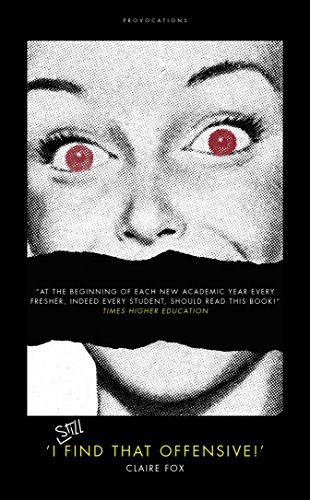What do you think?
Rate this book


NEW AND UPDATED EDITION OF THE BOOK THAT INTRODUCED THE TERM ‘SNOWFLAKE.’
When you hear that now ubiquitous phrase ‘I find that offensive’, you know you’re being told to shut up. While the terrible murder of the Charlie Hebdo cartoonists demonstrated that those who offend can face the most brutal form of censorship, it also served to intensify the pre-existing climate that dictates we all have to walk on eggshells to avoid saying anything offensive – or else.
Indeed, competitive offence-claiming is ratcheting up well beyond religious sensibilities. So, while Islamists and feminists may seem to have little in common, they are both united in demanding retribution in the form of bans, penalties and censorship of those who hurt their feelings.
But how did we become so thin-skinned? In this ned and updated edition of her book ‘I Find That Offensive!’ Claire Fox addresses head on the possible causes of what is fast becoming known as ‘Generation Snowflake’ in a call to toughen up, become more robust and make a virtue of the right to be offensive.
208 pages, Hardcover
First published January 1, 2016
[I]f a victim aggressively accuses you of offence, it is dangerous to argue back, or even to request that they should stop being so hostile, should you be accused of ‘tone policing’, a new rule that dictates: ‘[Y]ou can never question the efficacy of anger…when voiced by a person from a marginalised background.’ No wonder people are queueing up to self-identify into any number of victim camps…
The definitions of rape being used by the pupils were very broad, incorporating everything from unwanted advances to regretted sex, and were being discussed as though it was an imminent threat to each and every one of them.
They have been reared on stories about how vulnerable and in need of protection they are. Adult society has fed them a diet of anxieties and provided the language of safety and risk aversion that now threatens liberal values of tolerance and resilience […] we have socialised children and young adults to think of themselves as weak and fragile, reared them to believe that name-calling can lead to mental illness, that without therapy they won't be able to deal with independence, criticism or exams. This process has enfeebled them. They really are suffering a crippling malady. But it is one constructed by older generations' policies. With no clear idea of how to resolve things, the way they are taking ownership of this situation is even more destructive: they are starting to pathologise politics.